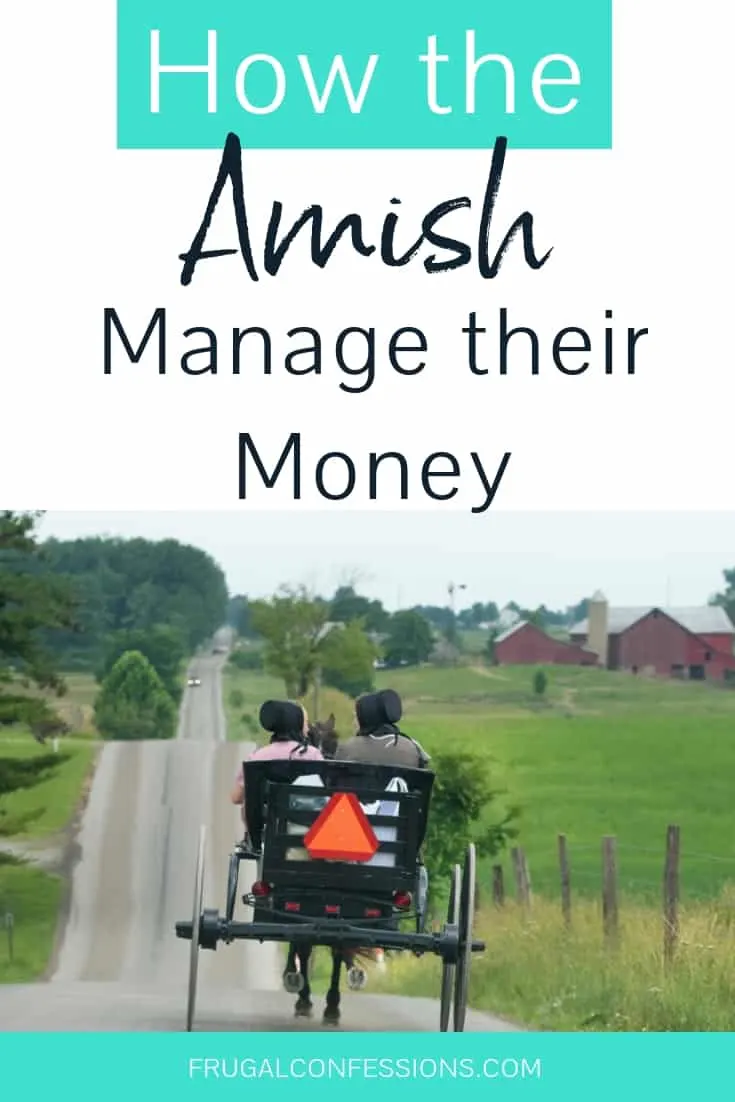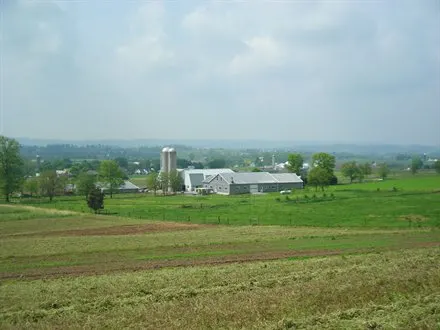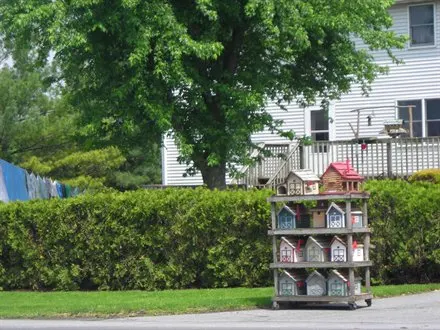How do Amish make money, and what are usable Amish money-saving tips? Let's talk about all things Amish money management.
When people hear that I'm from Lancaster County, PA, they often immediately ask if I am Amish.
My answer is usually something along the lines of, “Then you must not know anything about the Amish.”

I've had the distinct privilege of growing up in the heart of Amish Country. But I'm definitely not Amish.
While just like you and me – they make a living, pay taxes, have families, and are always looking for ways to save money – they differ greatly from us “Englishmen” in many respects.
So, how do the Amish live?
I'm going to talk about how the Amish live a bit, first (and how my father and I have had a front-row seat to learn about them).
And then, I'm spilling the beans on Amish money management secrets, plus some money-saving tips that are part of their lifestyle.
Amish Lifestyle – And How We've Gotten a Front-Row Seat to It
Ever wonder why the Amish live the way they do? It's to center their life around God and to preserve their culture.
Their religion is at the core and forefront of everything that they do and defines their way of life.
Psst: an excellent read on all things Amish that will give you an insider's view of the Amish lifestyle is Amish: In their Own Words. It was so good that I purchased a copy as a gift right after I read it!
They choose to not use electricity – perhaps one of the reasons they have been able to keep their community intact – and instead work hard, read newspapers and books, play games, and go around ‘visiting’ their many relatives and friends.
My father and our family have had the privilege to work one-on-one with the Amish and befriend several of them, all while making a decent income.
We do this by providing an Amish taxi service.
Amish are only allowed to drive horses and buggies; however, they can hire a person to drive for them, and pay that person a rate per mile as well as a waiting time fee (like $10/hour for a two-hour waiting time at the doctor's).
They're called Amish taxi drivers, and they can make some sweet money out of the deal. I would know because my father does this for a living, and I've even dabbled in Amish driving jobs.
It seems like a loophole in their system, but it’s one I am quite happy for because it has opened my family up to meeting some wonderful people, and to some great experiences over the last ten years or so (my father has driven families to Kentucky, Montana, Indiana, and I have personally taken a group of Amish on a fishing trip and on the metro in Washington D.C.).

As such, I can confidently write this article detailing some Amish finances and hope that it may shed some light for us Englishmen.
Please Note: I would like to thank my father, Tom Grossman, for allowing me to pick his brain, and all of the Amish in Lancaster County who have answered our questions. While this information is very accurate, it is meant to give a “picture” of what typical Amish finances look like. Some Amish families definitely sway from this, especially if they are struggling financially, or are in a more liberal-minded sect.
Amish Money-Saving Tips
One of the most striking differences between the Amish and us Englishmen seems to be their ability to save money.
Riding through Lancaster County, one can’t help but admire the beautifully manicured Amish homes, farms, and businesses.
Many of them are very large.


And though you could say it’s because they have to house so many children (upwards of 8, 10, and 12 in many families), you might start to wonder if the Amish know wise financial secrets that the Englishmen have yet to learn.
So, what are those?
1. They Sometimes Pay Less in Taxes
Do the Amish save money by not paying taxes?
It's a common misconception that Amish do not pay taxes.
The truth is that Amish pay most of the same taxes that we “Englishmen” do, except for Social Security and Medicare (if they apply for the Social Security Exemption based on their religion).
This does not mean they are a leech on the system; Amish also don't collect Social Security when they reach 65 and are not eligible for Medicare.
Insider tip: In order to claim this exemption through the IRS they must be a card-carrying member of their church.
One of the gripes from many people living in PA is that Amish buggies tear up the back roads of Pennsylvania and that the Amish do not pay a road tax.
I looked into this and found out that it's actually true, but not because the Amish are somehow exempt from this tax.
PA gets its funds for fixing roads from selling gasoline, and from collecting tolls on major highways, and we all know that Amish do not need to purchase gasoline, nor do they normally travel major highways.
That's how they don't currently contribute to the PA road system (which everyone knows is one of the worst in the country).
Finally, how do they “save” money on their federal income tax? My father had an interesting insight when speaking of federal income tax.
The Amish do pay this tax; however, I know of very few Amish families with less than 4 children (and 10 is more common than not).
This most likely cuts their overall federal tax bill because of the child tax credit.
2. They Start at a Really Young Age
Amish children typically attend school until they are 15 years old. All Amish then become apprentices to the many trades and businesses in their communities. There are farmers, welders, woodworkers, construction men, candle-makers, window-makers, etc. to choose from. As a teenager, the worker hands over their paycheck to their parents, who keep all of it in a bank account and give the child 10% for spending money.
Once the worker turns 21 the bank account is handed over to him.
Can you imagine if your parents had saved 90% of each of your paychecks you slaved away for turning hamburgers, mucking horse stalls (that’s what I did), or waiting tables?
Over several years, that money can really add up to a nice sum of change for college, starting out at your first apartment, or paying for wedding costs.
3. Young Adults Live at Home for Free
As mentioned previously, the money an Amish person makes as a teenager is handed over to them at the age of 21.
If you're not married at this age or any age, then you're expected to continue living at home and are not required to pay rent and such.
Very seldom do single Amish live outside of their parents’ home.
This means that if you choose to not marry at the age of 21, you now have a large sum of cash, few expenses, and a social network at your fingertips to catch you if you fall (one that you are a part of, and will need to help catch others as well).
What a stark contrast to when I was 21, in my third year of college (meaning having racked up considerable student loan debt already) and living in a dorm room several hours away from home.
4. They've Got Cheap Labor
As a person who grew up on a farm, I can’t believe I am actually touting the benefits of this one (and yes, my Dad is reading this).
But it's true that having lots of children who are able to maintain and operate a farm, household, greenhouse, or even a small business will save a ton of money simply because you don't have to pay the full cost of employees.
Pssst: Learn more about Amish kids and how parents manage their kid's money here.
5. They Have a Community Health Insurance Plan
Do the Amish have health insurance? No…at least in the sense that we know it.
Instead, they trust God, their savings, and the hearts of their fellow churchmen to provide for any medical bills.
At each church, there is a board of directors made up of fellow churchmen who collect premiums each month from the congregation according to the age and number of family members in their households (very similar to a group health insurance plan).
Just like you and I, Amish have tragedies and become very ill, and they use many of the same hospitals and doctors that we do.
If they need help with a medical bill, say a $20,000 surgery bill, they must speak with their Deacon (head of church) and tell him. An Amish man is only supposed to get help if he can’t pay the bill himself, and this is a decision between him and God.
The money for the surgery comes out of this pot of money divvied up by the board of directors, and any leftover sum that cannot be covered is provided by fellow churchmen.
This is probably a great system to encourage the Amish to save as much money as possible.
Think about how embarrassing it would be to reveal to the head of your church that you have no money stashed away for emergencies. Not only is this an admission of guilt to a man you hold highly, but it is an admission to the people at the core of your life: your family, friends, co-workers, social network, not to mention God.
6. Saving Money is the Root of Their Money Values
I've never understood why my money views are so different from many other people around me, or why in my teenage years I was focused on saving and investing towards my future when so many others wanted to spend.
That is, until recently when I picked up the book Money Secrets of the Amish (Lorilee Craker).
It turns out that my way of thinking is from my Lancaster County, PA farming roots where rural agrarian conservatism keeps Amish and Englishers alike planted firmly on the ground.
My family lived mostly off of the land as farmers (my parents always held side jobs to make ends meet such as bus driving for the local school district, nursing at the local hospital, and opening a farm stand).
Money was tight – I picked up on this at a very young – but something I didn’t realize until later was that we were also always at risk of having a ‘bad year’.
As we are seeing with the current drought situation in the Midwest, farming is not all about what the advertisements would make you think: families eating corn at a picnic table at the end of a long, hard day (there are plenty of those to go around – hard days, that is), and self-employment among rolling hills and endless horizons.
Farming can be downright risky.
Even though there is the Farmer’s Almanac and lots of meteorologists working on weather predictions, the fact remains that you can spend all of the profit you made in a good year purchasing seed and equipment for next year’s crop and come up with a field full of Johnson grass.
While the majority of the time you know that your crops will grow (though the market price will fluctuate), one lean year can cause your farm and finances to collapse if you have nothing in the bank.
This is exactly what happened to my family in the drought of 1999.
It is why saving resources during the good times is crucial in sustaining a farming lifestyle. And as we’ve seen in the financial meltdown and recession over the past several years where some lost their job for a sustained period of time, credit dried up and banks failed, this is vital advice for everyone.
The Amish came out of the Recession nearly unscathed, and many even prospered. So what are some of the other secrets that drive their rural agrarian conservatism?
7. They Pass On Money Wisdom
Craker’s book of Amish interviews and frugal advice really struck a chord with me.
Not only does it give great insight into how the Amish are able to save up vast amounts of money while raising a lot of children, but it also just feels like coming home to me.
These are my principles, these are my feelings, and while I never recognized before how my family and our Amish neighbors were bred and rooted from the same soil, I am completely convinced of it now.
Here are some memorable Amish money management quotes:
- “Ya gotta make up what you don’t have; don’t borrow it.” – Bishop Eli King
- While discussing spending money on retail, Daniel Miller passed along his father’s advice: “It’s either my money or it’s theirs. I prefer it to be mine.”
- “[A] dollar saved is better than a dollar earned because you are not taxed on the dollar saved.” – Elmer
- Bishop Jake said, “Making interest payments is like paying for a dead horse.”
- Bishop Ephraim stated, “Most of the Amish do not live on the edge.” (Wow is that the understatement of the century. I have been an Amish taxi driver in the past and had the pleasure of driving a group of young married couples up for a night at their cabin. One of the guys put a cassette tape in the car radio upon entering the vehicle and they all mischievously belted out the lyrics “If I said you had a beautiful body would you hold it against me? If I said you were an angel would you treat me like the devil tonight?” This was about the most edge I have seen. Of course, the Bishop was mainly talking about the financial edge, which the Amish also do not typically inhabit).
8. They Saving is Better than Earning More (Because of This…)
I used to drive Amish for a living (well if you can call working summers and holidays in between college semesters ‘a living').
Ah, memories.
Like that time I took an Amish family on the metro in D.C., or the group of young Amish couples I drove up to their cabin for the night with their cassette tape of “Beautiful Body” and hours of unsolicited karaoke (the Devil, my friend, is in those lyrics). I even saw Amish in bathing suits on a New Jersey beach.
Driving Amish is sort of a family affair. My father drives Amish for a living, my stepmother does as well, and each of my siblings has had their share of runs in Amish Paradise for errands, the market runs, doctor appointments, “visiting”, etc.
You can make good money driving Amish. How much do Amish pay drivers?
Well, for the summer that I drove Amish, I earned $0.55/mile and $10/hour of waiting time.
And if you can get past some of the “quirks” of driving around people who are generally not used to being in a vehicle {you don't want to know what a ‘whip' container is…trust me}, then it can truly be an eye-opening experience.
Especially after allowing the cultural divide to shrink and having genuine conversations with them.
Here’s one of my favorite lessons learned from one of those conversations:
“A dollar saved is better than a dollar earned because you are not taxed on the dollar saved.”
Think about the $201.34 Paul and I put back into our monthly cash flow by paring down our expenses. In order for us to reap that same amount by an income increase each month, we would have had to increase our earnings by approximately $270. Why is that? Because income is taxed, so in order to reap an overall increase in cash flow of $200 from bringing in extra money, you need to earn $270 (25% tax bracket).
We got the same results, just without having to pay any additional taxes.
I love that.
There are personal financial bloggers out there who will tell you that frugality is dead and that instead, you need to change jobs, earn lots more money, get a second job, etc. I agree with them that their advice leads to an increase in income and better cash flow (that is if you continue to spend less than you earn and keep lifestyle inflation at bay with the new money coming in).
But I only agree with using their strategy after you try to pare down your spending in a frugal decadent way.
In most cases, I think you are leaving some money on the table with your current paycheck and you can take advantage of it without paying extra taxes.
9. They Link Saving Money with their Value of Self-Reliance
At the core of their lives and finances is the idea that one must live a humble life.
From childhood, the Amish are taught to be grateful for the hand that God has given them, to not waste, and to be charitable to others.
It is difficult for anyone to point out many of the Amish who might be considered “rich” in their community because they shun flashiness, do not purchase the latest gadgets, shop at the same stores as everyone else, and are often seen wearing worn-out shoes, using decades-old tools, and driving hand-me-down buggies.
My father ends our interview with his dry sense of humor, stating,
“there are two different kinds of Amish: ones with money, and ones without”.
You could say the same about Englishmen.
Even though there are stark differences in the handling of finances between the Amish and the Englishmen, there are still Amish out there right now who have had their homes foreclosed on, who purchase things that cost too much for their budget, or who always walk around with the newest and greatest tools and products on the market.
The difference is, that when someone in the Amish community loses their house or farm to mistakes of their own making, their fellow churchmen and community members will not step in and save them.
As a culture of humble people who perhaps make statements best by their non-actions, the Amish feel that by allowing their community members to lose something like their house or farm, they can learn from their mistakes and learn the value of better financial management in the future.
But this is not as harsh as it may sound. One keen observation is that you will never find a homeless Amish person. They just don’t exist. So even if they find themselves having made the wrong choices, their family, friends, and fellow churchmen will still catch them from completely crashing to the ground, and then help them as they raise themselves up again. We should all be so lucky for this lesson.
Speaking of all this money…want to know how the Amish make their money?
How Do Amish Make Money?
Every Amish person has some sort of skill, trade, or hobby, and they are more than enthusiastic about selling it.
If you drive down Route 340 – the heart-line of Amish country in PA – you will see numerous signs detailing all of these varied skills, and arrows pointing to where you can purchase these goods from.
Even driving through back roads, where no more than five cars must drive per day, there are still signs all around selling products (see pictures below).
For the Amish who have a normal day job aside from their craft, they use an honesty box, which allows them to stay open for business all day long (except for Sundays, when all roadside stands are closed). They basically take a lock box with a slot on it and ask that you pay for the products that you purchase in this box.
Case closed.
And it must be working, or otherwise, they would stop using it.
Some of the goods include:
- canned vegetables
- jams/jellies
- birdhouses
- pies
- homemade root beer
- puppies/kittens
- cage-free eggs
- pygmy goats
- etc.
You would be hard-pressed to find such entrepreneurial spirit elsewhere in our country.
Perhaps you should make a homemade sign and stick it out in your front yard. Who knows how much business it may bring you?


This article is featured at Free Money Finance as a winner of the “Best of Money Blog Carnival”.
Amanda L Grossman
Latest posts by Amanda L Grossman (see all)
- 5 Surprising Ways to Cut Household Costs (Saved us over $1,412!) - March 11, 2024
- The No Spend Challenge Guide (Money Game-Changing Tool) - January 31, 2024
- 47 Seasonal Jobs in Alaska with Housing (Hiring for this Summer) - December 1, 2023

Pam
Tuesday 28th of August 2012
I have no reason to believe this way, I am not Amish and my parents were very careless with money but I totally am different.Thank you so much for writing this.
FruGal
Tuesday 28th of August 2012
Hi Pam!
You are welcome. And thank you for commenting--glad to find like-minded people.
Rebecca
Monday 27th of August 2012
Great post! What an interesting topic. I think the Amish are right on when it comes to their beliefs about money. Too bad mainstream America doesn't share the same views.
Amanda L Grossman
Tuesday 28th of August 2012
Thank you Rebecca! I agree.
Laura
Monday 27th of August 2012
What a great realization. The odd thing is that I have very similar values and perspectives on finances and I grew up in a big city. Maybe it was the European influence that changed my perspective, but I believe so many people nowadays borrow to live up to their lifestyle because that credit is readily available. Those people have never lived in a situation where it wasn't. It may be part of the way people are raised.
Great and thought-provoking post!
Amanda L Grossman
Monday 27th of August 2012
Thank you so much Laura! It was such a pleasure to write this article.
That is interesting that you have the save views with such a different background. It goes to show that we all pick up and latch onto different things throughout life.
Moh Z
Wednesday 1st of February 2012
What an enlightening article! Assuming that what is said is true, I am inspired by the spirit of the Amish people. I am not Amish. I came upon this article by my curiosity of an escrow-free mortgage. What I get from this article is an illustration of the independent, self-sustaining nature of a people who look to each other for support rather than relying on external sources to prop up their livelihood. This is admirable, and is - in my opinion - how it should be throughout our society. I would not subscribe to this religion personally, but much can be learned from their way of life and their views on personal responsibility, and to their dedication to family and friends. Thank you for shedding a bit of light on an obscure and little-known culture within our great nation. God bless. -An average Englishman.
FruGal
Wednesday 1st of February 2012
Thank you for the kind words!
Self-sustaining is a great way to describe the Amish.
C. Gordon Porter
Thursday 24th of February 2011
All that has been said is probably true, only we Englismen are trying to help people around the world for a freedom we enjoy, this is our way. We have unions that demand more and more and the non union people help pay for their added benefits, this is not exceptable. The Englishman farmer that has a perishable product can't make a demand when the product is ready for harvest for better pay so through out of country many have had to sell their land to the larger operators.(ours) sad for our small towns and the Nation. Thanks to the illegal Immigrants to do the harvesting with cheap labor, so we have plenty of food.